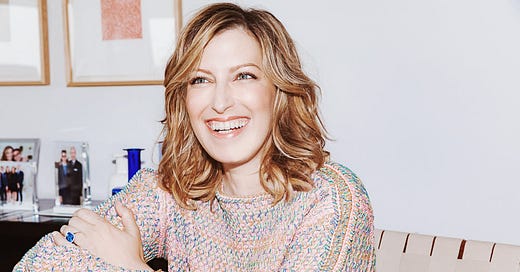The Mind-Beauty Connection: What Your Skin is Trying to Tell You
A conversation with Dr. Amy Wechsler
What if your skin could talk? No, not in a sci-fi horror-movie way—but in a real, grounded sense. What if your skin could reflect back the truth of how you’re really doing mentally and emotionally?
That’s the lens through which Dr. Amy Wechsler sees the world—and trust me, it’s not just poetic. It’s clinical.
She’s one of the very few physicians in the U.S. who’s board-certified in both dermatology and psychiatry. Which makes her uniquely positioned to explain why your stress breakouts, hormonal shifts, and sleep habits are just as important to your skin as your skincare routine.
We sat down together on this week’s episode of Inside the Wellspace to talk about the wild and often misunderstood relationship between your mind and your skin.
Dr. Wechsler didn’t just stumble into this double career. She started in psychiatry, then moved into dermatology. But she never left the mind behind. As she puts it,
“It was clear to me early on that everything shows up on the skin.”
And she’s right. Anxiety, depression, grief, hormones, trauma, joy—it all finds its way to the surface.
She sees it every day in her practice. One patient comes in with recurring eczema that flares every time she’s under pressure. Another suddenly develops cystic acne in her 40s after a brutal breakup. These things aren’t coincidences. Skin and psyche are in constant conversation.
First off, we need to call out the language around “anti-aging.” Aging is not a disease. But that said, there are solid, medically sound things people can do to keep their skin healthy, functional, and yes, vibrant as they get older.
Here’s what Dr. Wechsler says actually works:
Topicals like retinol – These help skin turnover and collagen production. Proven science.
Botox and fillers – When done right, they’re not about erasing age, but restoring balance and softening stress lines.
Lasers and peels – Great for resurfacing and pigmentation issues.
Hormone replacement therapy – Especially for post-menopausal women, topical estrogen can improve elasticity, dryness, and overall skin tone.
Sun protection – Non-negotiable. Every single day.
What doesn’t work? Chasing perfection. Believing you can erase 20 years with a cream. Or, ignoring the internal stuff while only treating the surface.
Your skin isn’t passive. It’s reactive, alive, and deeply affected by what’s happening inside your body. Over time, it naturally thins out, loses elasticity, and produces less oil. That’s just biology.
But here’s the kicker: Stress accelerates it all.
Cortisol—the primary stress hormone—directly impacts your skin. It breaks down collagen, leads to inflammation, triggers breakouts, and can even delay wound healing. That’s why chronic stress shows up on your face. And if you’ve ever looked in the mirror after a rough week and thought, “I look like I’ve aged five years,” you’re not crazy. You’re just chemically accurate.
Dr. Wechsler explains how even a few daily rituals can change this story:
Take 5 minutes to walk, stretch, breathe, or just be still.
Have sex (yes, alone or with someone—it’s not about the company, it’s about the oxytocin).
Go outside. Talk to a friend. Listen to music.
And for the love of all things bright and smooth—get some sleep.
Let’s bust a couple myths while we’re here:
There’s no hard proof that sugar directly causes acne in everyone. But diabetes? That’s a different story. Chronic high blood sugar damages skin cells. So yes, balance matters.
As for food and breakouts—unless you have a specific allergy or gut issue, it’s not about a single meal. It’s about patterns and inflammation.
And toxins through the skin? Most can’t even get through—molecules are often too big. Estrogen and nicotine are exceptions, which is why they’re used in patches. But most of what people worry about in clean beauty conversations? Doesn’t even make it past the barrier.
Dr. Wechsler isn’t just treating skin. She’s listening to people’s lives. And that changes everything.
“The most important thing,” she told me, “is that people feel heard.” That’s it. Not lectured. Not dismissed. Just heard.
She’s also quick to point out the difference it makes when doctors take time—especially female doctors. They ask more open-ended questions. They make space for the why behind the what. And that’s where healing starts.
Because treating someone’s skin without understanding their stress, relationships, hormones, sleep, and mental load is like putting a Band-Aid on a leak in the roof.
Here’s what Dr. Wechsler wants you to remember:
Take micro-breaks throughout the day to lower stress molecules: Walk, breathe, stretch, laugh, sing—whatever works.
Have sex. Pleasure is medicine.
Prioritize sleep and protect your skin from the sun. Always.
If you’re struggling with your skin, the answer might not just be in a bottle. It might be in your nervous system, your relationships, your sleep hygiene—or in giving yourself a damn break.
Because beauty isn’t about perfection. It’s about vitality. And your skin? It’s just trying to keep up with the story your mind is telling.
Want more real talk like this? Subscribe to Inside the Wellspace and follow the podcast for conversations that go deeper than skin. Literally.
My full conversation with Dr. Amy Wechsler is live TODAY on Youtube, Apple Podcasts, and Spotify.
With love,
Cathy











